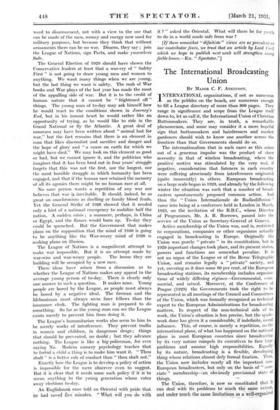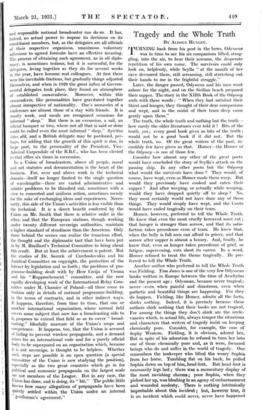The International Broadcasting Union
BY MAJOR C. F. ATKINSON.
INTERNATIONAL organiiations, if not as numerous as the pebbles on the beach, are numerous enough to fill a League directory of more than 800 pages. They range in significance and scope from the League itself down to, let us call it, the InternatiOnitl UniOn of Christian Buttomnakers:, m They are, in truth, a'. remarkable 'phenomenon, and some may consider it a more hopeful sign that buttonmakers and 'hairdressers and market gardeners should wish to know one .another 'across the frontiers than that Governments should do so.
The internationalism that in such cases as this arises out of a generous impulse was the product of sheer necessity in that of wireless broadcasting, where the positive motive was stimulated by the very real, if negative, conSideration that listeners in each country were suffering atrociously from interferences originated (quite innocently) in others. European broadcasting on a large scale began in 1923, and'already by the following winter the situation was such that, a number of broad- casters spontaneously proposed common action. And thus the " Union Internationale de Radiodiffusion " came into being at a conference held in Lcindon.in March, 1925, on the invitation of the B.B.C., whose Director of Programmes, Mr.. A. R. Burrows, passed into the service of the Union as Secretary-General at Geneva. Active membership of the Union was, and is, restricted to corporations, companies or other organisms actually engaged in. broadcasting in Europe. Originally the Union was purely " private " in its constitution, but in 1929 important changes took place,: and its present status, powers and functions are somewhat peculiar. It is not an organ of the League or of the Berne Telegraphic Union, and remains legally a " private' society, and yet, covering as it does some 90 per cent. of the European broadcasting stations, its membership includes organiza- tions of widely differing regimes—Governmental, com- mercial, and mixed. Moreover, at the Conference of Prague (1929) the Governments took the right to be represented in all'meetings of the Connell and Committees of the Union, which was formally recognized as technical expert to the European Administrations for broadcasting matters. In respect of the non-technical side of its work, the Union's situation is less precise, but the spade- work done has given it a conSiderable,If indefinite; moral influence. ThiS, of course, is merely a repetition, on the international plane; of what has hakiened on the national plane in most European countries since broadcasting by its very nature eoinpelS its executives to face large problems and 'assume' high responsibilities. EquallY .
by its nature; brOadeasting is a flexible, developing thing whose relationailmost defy forinal fixation, Thus, the Union now sineludes nearly all the iniportant non- European broadcastera, but only on the baSis of " asso- ciate " membership=in: obviously provisional state of thing's, The Union, therefore, is now so constituted that it can deal with' its problems to- much -the same extent, and under much the same limitations as a well-or and responsible national broadcaster can do so. It has, indeed, no actual power to impose its decisions on its constituent members, but, as the delegates are all officials of their respective organisms, unanimous voluntary adhesions to agreed formulae have an effective meaning. The process of obtaining such agreement, as in all diplo- macy, is sometimes tedious, but it is successful, for the delegates, living together as they do for several weeks in the year, have become real colleagues: At first there were the inevitable frictions, but gradually things adjusted themselves, and when in 1929 the great influx of Govern- mental delegates took place, they found an atmosphere of established camaraderie. Moreover, within this camaraderie, like personalities have gravitated together almost irrespective of nationality. One's memories of a conference are almost those of a stay with friends. It is mostly work, and meals are recognized occasions for informal " shop." But there is an excursion, a sail, an official banquet or two, where not all that is said or done could be called even the most informal " shop." Spiritus intus alit, and a British delegate may be pardoned, per- haps, for adding that the growth of this spirit is due, in large part, to the personality of the President, Vice- Admiral Carpendale of the B.B.C., who has been elected to that office six times in succession.
In a Union of broadcasters, above all people, moral and not statutes and documentation is the heart of the business. For, over and above work in the technical domain—itself no longer limited to the single question of wavelengths—there are varied administrative and artistic problems to be thrashed out, sometimes with a view to concerted and uniform action, sometimes merely for the sake of exchanging ideas and experiences. Neces- sarily, this side of the Union's activities is less visible than the technical. It is a direct benefit conferred by the Union on Mr. Smith that there is relative order in the ether, and that the European stations, though working under twenty different sovereign authorities, maintain a higher standard of steadiness than the American. Only those behind the scenes can realize the tenacious effort, the thought and the diplomatic tact that have been put in by M. Braillard's Technical Committee to bring about this result. But at least the achievement is patent. But the studies of Dr. Sourek of Czechoslovakia and his Juridical Committee on copyright, the protection of the listener by legislation and so forth ; the problems of pro- gramme-building dealt with by Herr Czeija of Vienna and his " Rapprochement " committee, and the now rapidly developing work of the International Relay Com- mittee under M. Chamiec of Poland—all these come to fruition only in details of national programme-building, in the terms of contracts, and in other indirect ways.
It happens, therefore, from time to time, that one or another international organization, whose normal field covers some subject that now has a broadcasting side to it, proposes to extend that field so as to cover " broad- casting," blissfully unaware of the Union's scope and competence. It happens, too, that the Union is accused of failing to prevent wireless propaganda, and a demand arises for an international code and for a purely official body to be superposed on an organization which, because it is not sovereign, is thought to be helpless. Whether such steps are possible is an open question (a special committee of the Union is now studying the position), especially as the two great countries which go in for political and economic propaganda on the largest scale are not members of the League. But in any case, the Union has done, and is doing, its " bit." The public little knows how many allegations of propaganda have been quietly settled within the Union under an internal gentleman's agreement."



















































 Previous page
Previous page